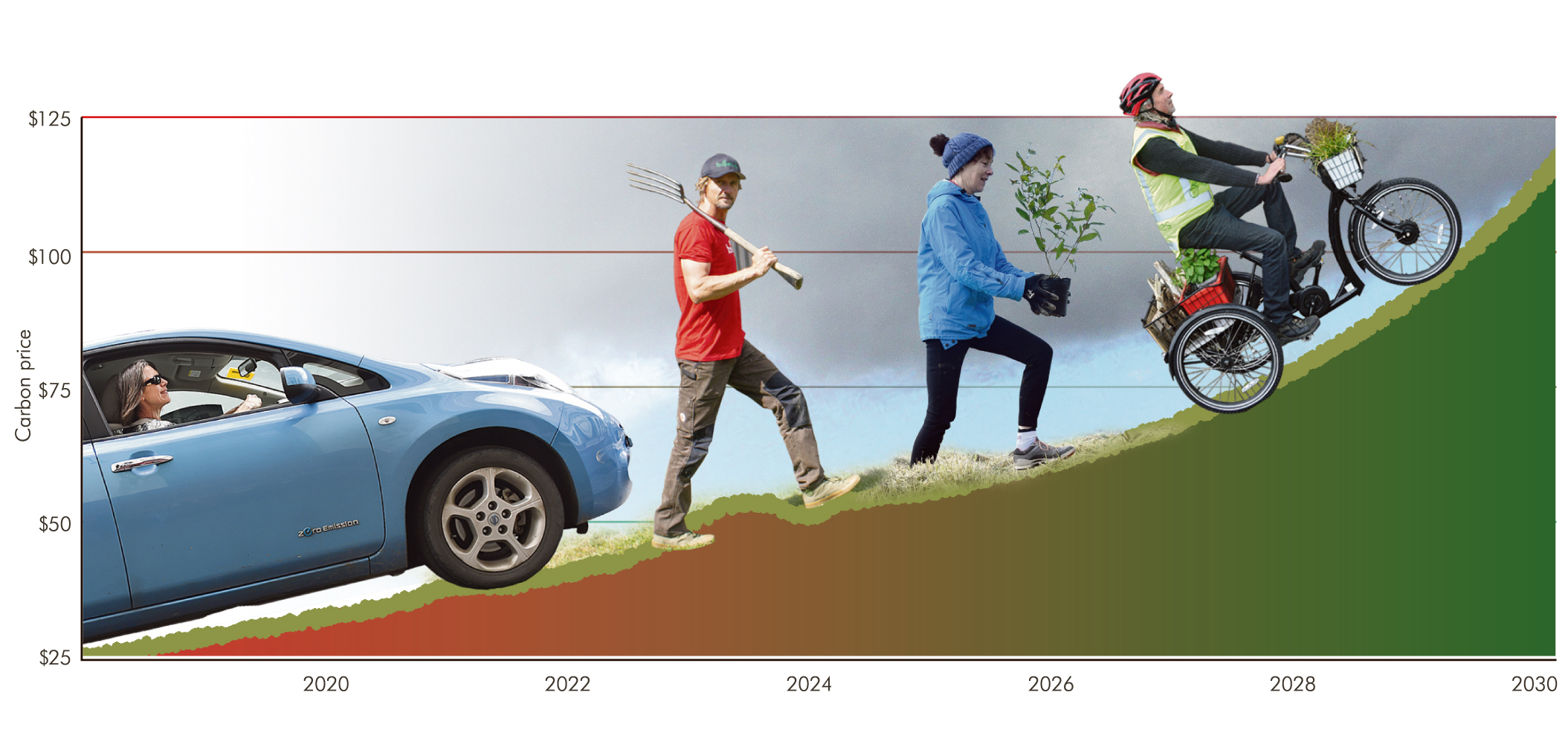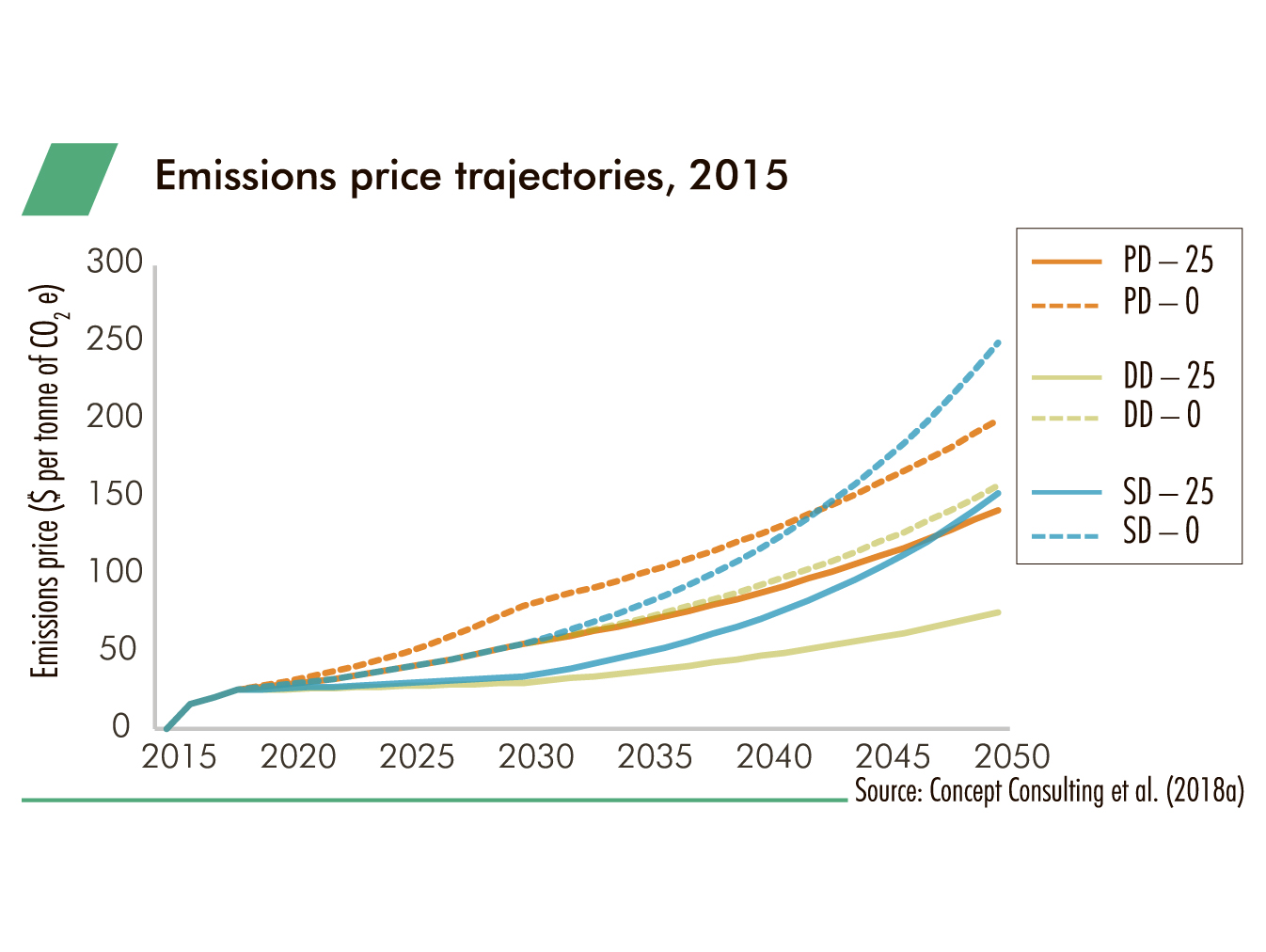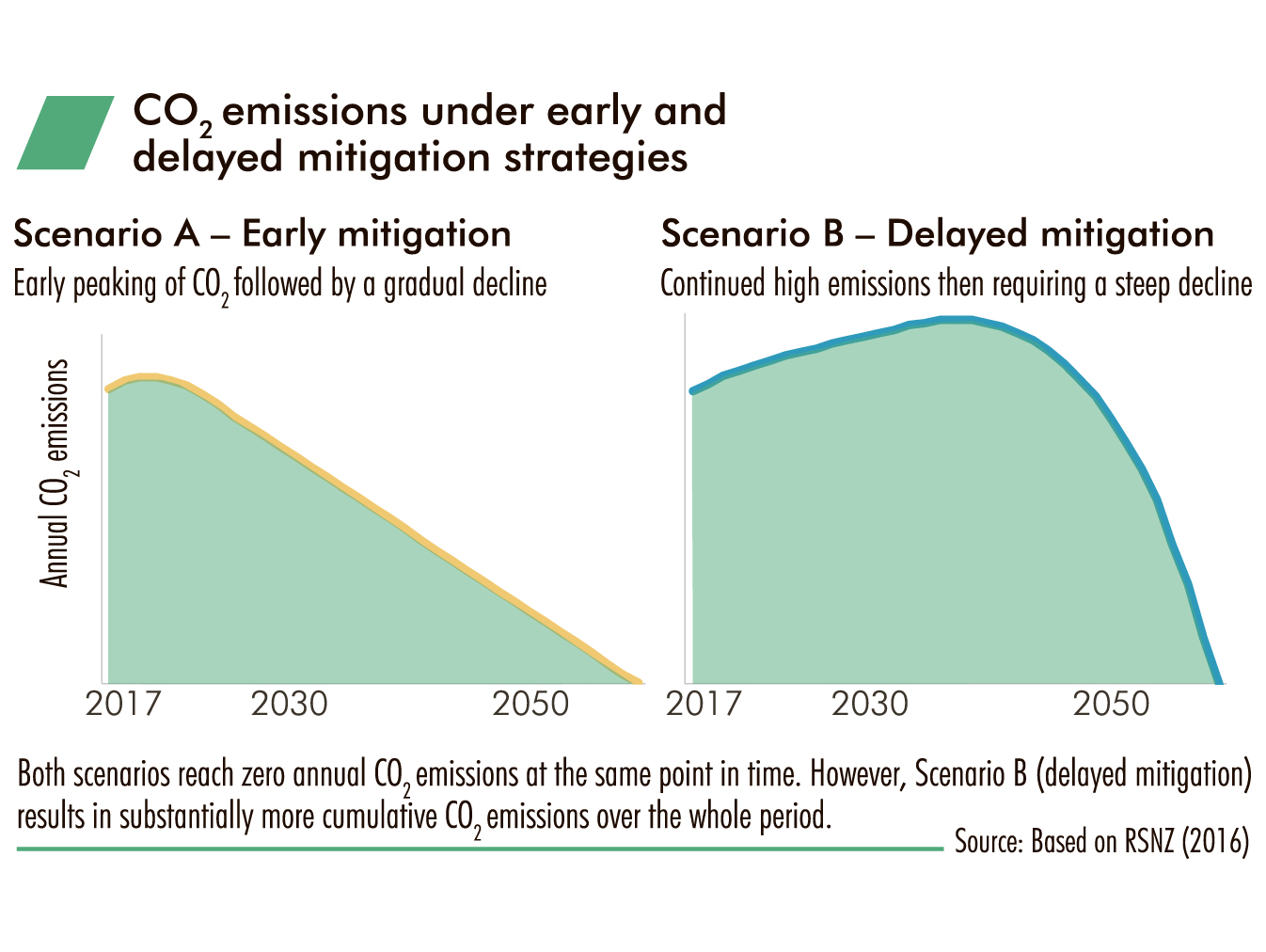
Because we need to head off climate change, the Government is preparing a Zero Carbon Act. So it's time to identify one or two ways to get ahead of the curve and prepare for low-carbon living. Maureen Howard looks at the options.
A shift towards a zero carbon world will mean fossils fuels are out and renewables are in. Renewable electricity will be good, petrol bad.
So the companies that trade in oil, petrol and diesel will be against it, for sure. Right?
Well, no, actually. Not in every case.

Here's a snippet from a recent Z Energy submission on the topic: "A high and rising price on carbon is the single most important regulation which could be introduced in order to transition to a low emission economy''.
What they are saying there, is that they think measures should be taken to make their current primary products more expensive relative to cleaner-greener options.
That submission, penned by Z Energy's sustainability manager Gerri Ward, on the Productivity Commission's recent Low-emissions economy report, also includes the observation that the current emissions trading scheme price on carbon is "far too low to effect meaningful change''.
On the phone from Z HQ, Ward fills out the picture.
Z Energy is looking to reinvent itself, she says, shifting from a distributor of fossil fuels, to become a distributor of transport fuels. And that can be carbon or zero carbon, fossil fuel, or a mix of electric and biodiesel.
"We get to be at the centre of the climate change solution in a way that is unique,'' Ward says.
It is not just the company's sustainability manager singing this song. Z's chief executive, Mike Bennett, initiated the Climate Leaders Coalition, the membership of which now includes the chief executives of 60 New Zealand companies, including Fonterra, Air New Zealand, and Spark. The Otago Polytechnic recently became the first tertiary education institution to be accepted. Together, the coalition is responsible for about half of New Zealand's gross greenhouse gas emissions.
Members have committed their companies to setting emission targets that are consistent with keeping the planet's climate temperature rise to less than 2degC.
Z Energy has been dipping its toes in the waters of low carbon transport for some time, installing public chargers for electric cars,
investing in an electric car sharing company,
and taking a 70.1% stake in Flick, an electricity company.
Ward says, like many businesses, Z Energy will be pleased when the proposed Zero Carbon Act becomes law.
"Policy certainty is necessary for long-term investment,'' she says. "The strategy for staying in business is to stay ahead of the curve.''
That's a sentiment shared by the Productivity Commission, which has been looking at how the country might get to carbon zero.
In its draft Low-emissions economy report it said the biggest risk factor was "very human'' and "the same for all countries - namely, the difficulties people face in making decisions in an environment characterised by deep uncertainty about what the future will hold''.

The Zero Carbon Act is designed to provide that certainty, delivering a clear signal about where the future lies. That done, Emeritus Prof Colin Campbell-Hunt says businesses, and others, will be able to make decisions about what sorts of opportunities are out there and what sort of investments are going to pay off. Jobs will follow those decisions in new more climate friendly directions.
Prof Campbell-Hunt, who was previously at the University of Otago Business School and now works out of the university's Centre for Sustainability, welcomes it.
"The whole world is facing a fairly radical change in the way that economic activity is organised. We are completely predicated on oil as a basis for our economic activity and that is going to change over the next two or three decades and that means there is going to be all kinds of opportunities for new businesses to arise in places that we cannot possibly predict. If New Zealand is up for this there is a lot of potential here.''
The Zero Carbon Act, due to come into force next year, is not our first attempt to create some clarity around efforts to reduce greenhouse gases. New Zealand established an emissions trading scheme in 2008, but as Parliamentary Commissioner for the Environment Simon Upton commented recently, it "has been operated with muted price signals and consequently had little effect''.

New Zealand's emissions have been on an upward trend since 1990. Net greenhouse gas emissions are 54% above 1990 levels.
Having signed up to the Paris Agreement, New Zealand is now committed to doing its part towards holding any increase in global average temperature to "well below 2degC above pre-industrial levels''; and indeed pursuing efforts to limit any increase to 1.5 degrees. That means bringing our emissions down: we have pledged to reduce our emissions to 30% below 2005 levels by 2030.
Top of the list of targets for reducing New Zealand's greenhouse gas emissions will be transport. It is responsible for almost 20% of total greenhouse emissions in New Zealand, and the private car is responsible for almost 60% of that.
Emissions from farming make up a bigger chunk of our climate warming output, but it is not going to be straightforward to bring those down quickly [See infographic page 6]. Transport is lower-hanging fruit.

That last bit is key. The incentive to change will be driven, to a significant extent, by a reinvigorated emissions trading scheme setting a higher price on carbon emissions. It is estimated that to hit a net-zero GHG target by 2050, the price of emitting a tonne of CO2 will need to climb over time from the current $25 to something between $150 to $250.
Consultants Infometrics have estimated that a $100 a tonne emissions price would raise retail petrol prices by 28 cents a litre. Other transport fuels would start looking a lot better.
Former Warrington school principal Nathan Parker is in the vanguard of the shift to a lower-carbon economy. He now runs a business selling electric bikes, operating out of the Valley Community Workspace in Northeast Valley, Dunedin, where other low-carbon entrepreneurs are pursuing ventures including electric vehicle conversions. Parker believes the Zero Carbon Act will "pull people'' into changing behaviours.
"I'm already having people coming in and saying `we've just bought an electric bike from you and we are now getting rid of a vehicle'. That just puts a huge smile on my face.''
Early adopters of new transport technologies such as Parker and his customers will use their lithium-ion batteries to pedal steadily ahead of the carbon-price curve - which is precisely what the Government hopes will be the response to the Zero Carbon Act. It is not a revenue-gathering exercise.

That's a point Climate Change Minister James Shaw is keen to emphasise.
"We actually don't want people to pay it. We want people to work out how to avoid it and the way to do that is by switching to ... lower emission consumption,'' he says.
There is time to do that. The price of carbon emissions will increase gradually through to 2050, so individuals and businesses can make the necessary changes.
"The whole point of the 30-year transition is that it is gradual and predictable and it allows time for research and development into newer lower emission forms of technology that maybe currently don't exist,'' Shaw says.
So how do we get ahead of the curve?
Enter Enviro-Mark Solutions. They provide GHG emissions calculators for both businesses and households. The household calculator is free and allows anyone to calculate their emissions from waste, electricity use and transport.
The company also takes its own advice. Its annual emissions are available on its website, along with the steps they are taking to reduce them.
Chief executive Dr Ann Smith is part of that effort.

"I won't travel [by plane] somewhere just for one meeting,'' she says. "But it is a challenge for us as we are growing and need to travel for audits.''
It makes a lot of sense for businesses to start monitoring their GHG emissions now, Smith says.
"Until you have an audit, you don't have a baseline that you can be confident about,'' she says.
For households, it is way of finding out where they are contributing most: they might be surprised. For example, the online emissions calculator can tell you whether it is more climate friendly to drive alone in a large SUV from Christchurch to Dunedin or to take a flight.
So how do we park our CO2 producing cars?
Lower-carbon alternatives include walking, cycling, electric vehicles, car-pooling and public transport.
While electric bikes are flattening geography everywhere, Christchurch is particularly well set up for cyclists, and boasts the most commuter cyclists of any urban area in the country. Numbers are growing on its extensive network of off-road cycleways.
Meg Christie is one of the reasons why Christchurch is seeing a resurgence in cycling. In her spare time, she is the convener of Frocks on Bikes, is on the Biketober Christchurch planning committee, and part of an initiative that provides a free bike fix-up service in low socio-economic areas. Frocks on Bikes is very much about helping people to get back on their bike, she says.
"We are visible because there are about 10 to 30 of us,'' when they go out on the road.
Frocks are in fact optional.
"Frocks are a euphemism for everyday clothes ... we want to get the message out there that any clothes are cycling clothes,'' Christie says.
A bicycle, even an electric one, may not suit all. Electric vehicle ownership in New Zealand is small but rising exponentially.

Climate Change Minister James Shaw is an advocate.
"The running cost of an electric vehicle is about 30% less per kilometre than a petrol vehicle,'' he says.
"Over the course of the next 30 years you will probably see that gap increase, especially as we get much more renewables on stream and people are able to start charging their cars from the solar panels on their roof.''
Transport isn't the only area where progress can be made.
Whether it is meal out or something cooked up at home, greenhouse gases are a big issue for the food industry. How we eat has a huge impact. In a 2017 study, the New Zealand Agricultural Greenhouse Gas Research Centre calculated that livestock alone have contributed about 23% of the human-induced global warming so far. Emissions of methane and nitrous oxide, and conversion of forest to pasture were the primary causes.
Climate-friendly eating is a passion for Anna Graham-DeMello and Jono Drew, who have created a social enterprise business called the Plant Based Living Initiative, in Dunedin. Graham-DeMello is a nutritionist and Drew is a medical student who completed a thesis last year modelling the different eating patterns of New Zealanders and the associated emissions.
"The central message,'' Graham-DeMello says, "is that whole plant foods, things like vegetables, fruit, legumes, nuts and seeds, wholegrains ... are essentially climate-friendly foods.''
And on the topic of making a transition?
"If you're a meat eater, switch away from beef and lamb to eating pork and chicken,'' she advises.
The association between food and greenhouse gases does not stop here. In New Zealand, food and garden waste account for about 25% of what we send to landfill by weight, the single largest waste category. When that organic waste breaks down in the landfill it can produce the greenhouse-gas methane. Solutions: cut out the waste and compost.
Increased landfill levies have been signalled as part of efforts to address the situation.
So, measures are coming to incentivise climate-friendly change. And there are options out there to get ahead of the curve. The trick, is to make a start.
- Additional reporting Tom McKinlay

Maureen's tips for climate-friendly actions
Dr Maureen Howard was for nine years Dunedin's sustainable living facilitator, contracted to the Dunedin City Council. She hosts the fortnightly sustainability radio show Eco Living in Action on Otago Access Radio.
Start making changes based on what is easy in your life, what is enjoyable for you and what is important.
TRANSPORT
Sell a car and go multi-modal (carpool, bus, bike or walk). With the money saved, you will easily afford the occasional taxi.
Fly less and explore alternatives. Holiday more in New Zealand. Travel by car or inter-city bus at least part of the way. Use video-conferencing in your workplace.
FOOD
Reduce and replace meat from ruminant animal sources (beef, venison, lamb and mutton) with meat from non-ruminants (pork and chicken).
Increase your whole-plant foods such as nuts, seeds, vegetables and fruits.
Grow your own vegetables, or join a community garden.
FOOD AND VEGETABLE WASTE
Set up a composting system. Put a collection container close to where you prepare food.
INFLUENCE OTHERS
Walk the talk and leave behaviour trails of your new actions. People are natural copiers. Join an advocacy group, and encourage the groups to which you belong to take climate friendly actions.
Enjoy yourself! People are attracted to someone with a positive outlook.
Finally, pull on some gumboots and plant trees, preferably native ones.

Crunching the numbers
Beginning in September, Dunedin man Steve O'Connor measured his household's carbon footprint for one month. Here's what he found out.
Location: Northeast Valley
Household: O'Connor, wife Jenny, three children (two grown).
Lifestyle: All-electric heated home. One-car household.
RATIONALE
EnviroMark's Household Carbon Calculator allows households to calculate their carbon footprint in terms of kilograms of carbon dioxide equivalents (kgCO2e).
RESULTS

Transport: 473kgCO2e. (National average equivalent 975kg.) Two domestic flights contributed the majority, while the car sat mostly idle. Instead, the family walk, bus and ``cycle - the best way to get around Dunedin''.
Household energy: 177kgCO2e. Above the national average of 113kg, O'Connor believes this is partly because they cook so much at home.
Waste: 8kgCO2e. (National Average 117kg.) No organic waste goes to landfill.
REFLECTIONS
O'Connor views the calculator as a ``consciousness-raising'' exercise. ``I just wanted a measure of what we normally did.'' He is surprised meat and dairy consumption are not measured.
Having completed the exercise, he says ``these things take a while to think through how to do stuff''. Looking to the future, he would like:
• their next car to be an electric.
•to reduce their single-plastic use.
•to remember to do the carbon calculator again at the same time next year.
Comments
Bravo. By lowering the NZ standard of living, which inevitably will follow this vandalism, the world will be saved.
Oops, hang on. Given the size of the NZ economy it won’t make a fig of difference to CO2 emissions.
Oh well. Good try. Let the social manipulators keep going. I’m pretty sure they will retain their comfortable government-paid jobs come what may.
The Dunedin City Council is utterly uninterested in climate change. For example they refuse to assist dealing with the regular flooding of septic tanks at Aramoana and even prosecute people who build boats in response to the rising waters, Ymmv.
It's a curious fact that these planet saving do-gooders pushing for electric vehicles (and yes, even bikes) don't seem to realize that the electricity needed to recharge their vehicles has to be generated somewhere; it doesn't just come out of a plug on the wall.












